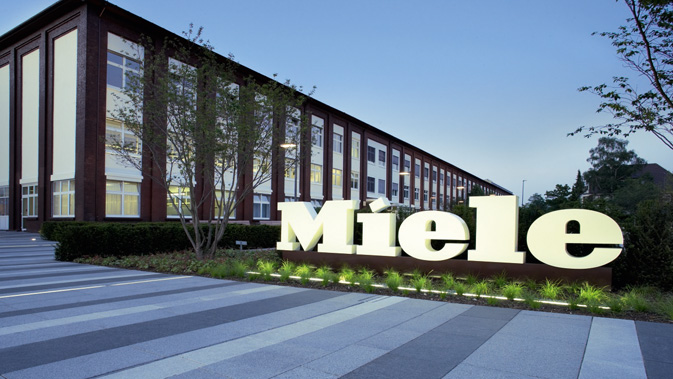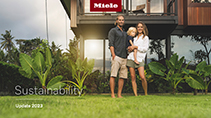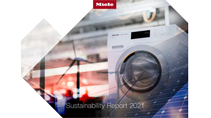Press releases
Miele sets stage for sustainable and successful future

-
Biggest growth and innovation offensive in company history
-
Reduction of around 1070 jobs worldwide, thereof 240 in Germany, due to necessary cost reductions in Administration, Marketing and Sales
-
Around 470 new jobs to be created elsewhere
Miele initiates thorough transformation 120 years after its inception. The objective is to expand the company's leading market position in the premium segment for domestic appliances and commercial machines whilst at the same time sustainably securing the economic standing of the entire Miele Group. New business units, a more powerful format for worldwide sales, a new location for digital marketing and sales and the entry into new business fields, for example, will contribute in a major way to achieving this goal. This realignment will result in clear savings in terms of business costs which will also impact staffing levels: By the end of 2021, around 1070 jobs are to be shed worldwide, thereof approximately 240 in Germany. This is to be done in a responsible manner, with the least possible social impact, and in close collaboration with Works Councils.
The Gütersloh family-owned company reported around € 4.16 bn turnover and more than 20,200 employees in its 2018/19 financial year. This corresponds to turnover growth of more than 30% and an increase of more than 17% in staffing levels with reference to the last five years. And, the first quarter of the current business year points to further growth. At the same time, however, account must be taken of far-reaching changes in the marketplace and in consumers' habits which present huge challenges to the entire branch of industry.
Urgent need for action, but above all enormous opportunities, result for instance from strong growth in the significance of digital channels and mobile devices to the way customers obtain information and communicate. This is further exacerbated by the increasingly price-aggressive behaviour of Asian corporations. Furthermore, economic prospects in important markets are greatly subdued. This situation is triggered by familiar geopolitical conflicts and risks to which no end is in sight.
In this changing situation, the German family-owned company continues to rely on the strength of its brand, its unique claim to quality and its compelling innovations. This will be accompanied by a greater focus on new business fields and on increased speed and flexibility in developing new products and services. At the same time, the company will realign in the fields of administration and sales with a view to greater growth, optimise its processes in all areas and hence achieve greater latitude in terms of costs and prices. The associated challenges and opportunities will be tackled from a position of strength and with the necessary vigour.
New management structure strengthens entrepreneurial mindset
In order to unlock potential for greater growth and identify cost efficiencies for the entire Miele Group and derive concrete measures, Miele launched its Design2Excellence (D2E) programme a year ago. Core results:
In order to promote a sense of entrepreneurial accountability within the organisation, the operative business is to be bundled in eight business units. The management of individual units will be given full decision-making powers with respect to their value-creation chains. These are answerable to the Executive Board with respect to turnover, costs and profitability. This gives greater power to managers and makes for shorter lines of command and decision-making. With respect to commercial machines and in the field of medical technology, it is also planned for the respective business unit to assume responsibility for worldwide sales and service at foreign sales subsidiaries.
The 'New Growth Factory' business unit has been specifically created to identify new fields of business. The objective is to move beyond current core business areas to put the company on a broader footing and tap new sources of revenue.
In order to exploit the potential of markets to the full and to cash in on regional synergies, Miele is to restructure its sales units worldwide. China, the USA and Canada, for instance, will in future report directly to the Executive Board.
To continue the expansion of Miele's digital marketing and sales expertise, digital marketing, e-commerce and digital analytics are to be merged into a new unit. The Miele Group's new Digital Hub Marketing & Sales is to be set up in Amsterdam.
To finance necessary future investments and sustainably secure the company's economic standing, savings in the order of € 190 m per year are to be achieved, including tried-and-tested programmes which are already running to continuously improve productivity and purchasing. This figure will predominantly come from reductions in material costs, although reductions in the personnel sector are also unavoidable. This applies to the avoidance of parallel structures and the pooling of resources in Sales, Service, Logistics, IT and standard financial operations.
On balance, around 240 jobs could be shed in Germany by the end of 2021, mainly in Gütersloh (Central Headquarters, Miele Germany). Outside Germany, around 830 jobs may be affected.
The Executive Board is fully aware of the huge impact of these cuts on the employees concerned. Consequently, every effort will be made to arrive at responsible and socially acceptable solutions which reflect the values of the company. The objective is, wherever possible, to avoid enforced redundancies. The next phase will include detailed negotiations with Works Councils, which will commence immediately.
'Decisive contribution towards a sound and strong family-run Miele'
Elsewhere within the company and in the course of D2E, around 470 jobs shall be created to strengthen Miele's digital expertise, to exploit new business fields and at further new locations to provide cross-border support in the above-mentioned areas. Also under the auspices of D2E, Miele will continue its proven MWS 4.0 productivity drive at its production plants. The efficiency gains achieved are intended to offset employees entering retirement and allow for growth in unit output with the existing workforce. Across all plants, this will result in savings of a mid-range 3-digit figure in terms of new employment contracts.
Design2Excellence should not be confused with the 'Laundry Care 2025' programme which brings together preparations for the future relationship between the Gütersloh washing machine plant (GTG) and the new production plant in the Polish town of Ksawerów. At the GTG plant, around 650 jobs are to be shed, but only through to the end of 2025. Ensuring that this long-term reduction is effected in as socially acceptable a manner as possible is already the subject of intensive negotiations with the Works Council and the trade union.
According to the two Executive Directors and Co-Proprietors Dr. Markus Miele and Dr. Reinhard Zinkann, 'implementing the proposed changes will be a tour de force which will only be possible with the support and the backing of the workforce'. But such effort will be worthwhile 'as we are all making an essential contribution to sustainably securing Miele's standing as the sound, strong and independent family-owned company it is today'. Miele and Zinkann manage the Miele Group on an equal footing together with the three non-family Executive Directors Olaf Bartsch (Finances/Administration), Dr. Stefan Breit (Technology) and Dr. Axel Kniehl (Marketing/Sales).
Company profile: Miele is the world's leading manufacturer of premium domestic appliances including cooking, baking and steam-cooking appliances, refrigeration products, coffee makers, dishwashers and laundry and floor care products. This line-up is augmented by dishwashers, washing machines and tumble dryers for commercial use as well as washer-disinfectors and sterilisers for use in medical and laboratory applications (Miele Professional). The Miele company, founded in 1899, has eight production plants in Germany as well as one plant each in Austria, the Czech Republic, China and Romania. These are joined by the two plants belonging to Miele's Italian medical technology subsidiary Steelco. Turnover in the 2018/19 business year was around € 4.16 bn, with a share of business outside Germany of approx. 71%. Miele is represented with its own sales subsidiaries and via importers in almost 100 countries. Throughout the world, the family-run enterprise, now in its fourth generation, employs a workforce of around 20,200, whereof 11,050 are employed in Germany. The company has its headquarters in Gütersloh in Westphalia.
Download as PDF
Carsten Prudent
+ 49 5241 89-1951
carsten.prudent@miele.com

